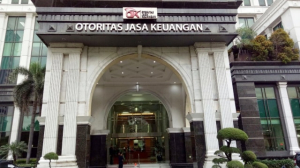OJK: Comprehensive carbon market ecosystem to achieve net zero emissions
The Financial Services Authority (OJK) says the launch of the carbon market in Indonesia in September 2023 has been insufficient to meet the target of net-zero emissions by 2060.
Inarno Djajadi, Executive Head of Capital Market Supervision, Financial Derivatives, and Carbon Markets at OJK, believes that to achieve the net-zero emissions target, a carbon market ecosystem needs to be built simultaneously.
"It cannot be just the carbon market itself, but also efforts to improve the ecosystem, whether from the regulatory side, or perhaps policies for setting upper limits for carbon emissions need to be changed," Inarno said on Thursday, February 15, 2024, as quoted by Antara.
OJK also proposes the implementation of reward and punishment mechanisms and an upper limit for carbon emissions for industrial players.
This approach encourages industrial players, for instance, to reduce their emission levels by up to 80 percent or face sanctions if they fail to do so.
However, Inarno acknowledges that emission reduction efforts require the development of technology with significant costs.
Therefore, paying a carbon tax or buying carbon units can be an alternative for industrial players who are unable to reduce their emissions to avoid penalties.
"If the cost is too high, they may be able to pay a carbon tax or buy carbon units on the carbon market," Inarno stated.
He also mentioned that the development of the carbon ecosystem needs support from all stakeholders, especially those who are primary players in this sector.
"For the operation of the exchange, which is the secondary market, is under our supervision, while the primary market is not under us, but the Ministry of Environment and Forestry (KLHK) and related agencies," he said.
Separately, the Indonesia Stock Exchange (BEI) is optimistic that the number of users of carbon market services this year could exceed 100.
This projection takes into account the achievement of the integration of the Apple Gatrik system with the national climate change control registration system (SRN-PPI).
"Our target is an addition of at least 50, meaning if at the end of last year it was 46, by the end of 2024, at least 96, and we are optimistic about more than 100," BEI's Director of Development, Jeffrey Hendrik, said.
Tag
Already have an account? Sign In
-
Start reading
Freemium
-
Monthly Subscription
20% OFF$29.75
$37.19/MonthCancel anytime
This offer is open to all new subscribers!
Subscribe now -
Yearly Subscription
33% OFF$228.13
$340.5/YearCancel anytime
This offer is open to all new subscribers!
Subscribe now







